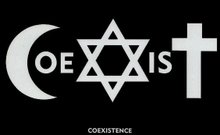I compiled the following rather lengthy study on the destruction of Sodom a few months ago, but held off on posting it because a debate on the topic of homosexuality unexpectedly transpired on my blog. So, I decided to let the dust settle and wait for a more appropriate time to emerge. Since I just finished listening to yet ANOTHER dishonest sermon on the subject of Sodom, I felt it was time to post it. Please read ALL the way through before bombarding me with comments. Thank you.
"It is not enough to rage against the lie, you have to replace it with the truth."--Bono
If you were to ask most evangelical Christians "What was the sin of Sodom?" I guarantee most would unflinchingly answer, "homosexuality." I want to examine the story of Sodom because I am utterly ashamed of how many preachers (not all) abuse, edit, and twist this account to single out gay people, elevate their sin above the rest of our "normal" sin, and perpetuate the lie that there is some sort of extra fiery judgment awaiting them. Every time there is a gay person on TV or a gay parade, it is always noted as a sign that America is "a modern day Sodom." While an honest and comprehensive study of Sodom in the scripture will definitely affirm that America is headed down the same path as Sodom, it is not for the reason most people think.
The Genesis account DOES NOT name the specific reason for Sodom's destruction. God speaks to Abraham and says He is going to destroy the city "because the outcry against Sodom and Gomorrah is great, and because their sin is very grave," (Genesis 18: 20). God sends two angels to rescue Lot and his family and that is when the mob of ALL the townspeople of Sodom, not just the men (Gen. 19: 4), surrounded Lot's house and demanded to "know" God's messengers. Lot unbelievably offers his daughters to the angry mob, but the angels strike the crowd with blindness and Lot and his daughters escape before God destroys Sodom.
While this vile scene epitomizes the extent of Sodom's wickedness, it was NOT what brought on their destruction. God already decided to destroy the city before this incident and sent the angels to rescue Lot and his family. God said to Abraham BEFORE that their destruction was in RESPONSE to the massive outcry against Sodom. The angels repeat this by declaring in Genesis 19:13: "For we will destroy this place, because the outcry against them has grown great before the face of the LORD, and the LORD has sent us to destroy it.”
Old Testament scholar Inge Anderson makes a good point by noting:
"Saying that the last recorded acts of the Sodomites -- the demands for same-gender sex -- are proof that they were destroyed for homosexuality is like saying that a condemned man cursing his guards on the way to his execution is being executed for cursing the guards. Sodom was judged worthy of destruction before the incident with Lot and the angels."
But what exactly brought on Sodom's judgment? Why were so many crying out against Sodom? Exactly whose outcry was God answering? Genesis 14 describes that Sodom and other cities had just engaged in brutal warfare, savagely pillaging surrounding cities and shedding innocent blood. It makes sense that the surviving victims of such heinous violence cried out against Sodom for their war-mongering, violence, and lust for conquest. In turn, Sodom was also invaded and pillaged, caught up in the cycle of warfare and violence.
Even those who insist that it was the incident between the angry mob and the angels that brought on Sodom's destruction, homosexuality is NOT the only sin at play during this scene. Let's start with the obvious: RAPE. Rape is NEVER permissible, whether it's homosexual rape or heterosexual rape. The townspeople weren't after consensual adult sex, but savage, degrading rape. Anyone who knows anything about rape knows that it has more to do with power, dominance, and humiliation than it does with sexual lust. Besides the intent to rape, there is another obvious sin going on. The people of Sodom did not want to rape mere mortal men, but ANGELS. In a sense, they wanted to commit bestiality, because it was inter-species sex, (ick). Sexual union with angels is forbidden for all humans, men and women alike (see highly debated Genesis 6).
Some biblical scholars speculate that the Sodomites' motives for demanding sex with angels has to do with something other than just lust. Some point out that it was not unusual for foreigners in ancient lands to be raped as a means of humiliation and control, as well as to discourage other foreigners from settling in or traveling through a city's territory. Also, ancient armies used rape as a means of interrogation. It was their way of torturing strangers, foreigners, and enemies to get them to give up information. This would be especially common for a city on high alert after warfare. Other scholars point to Sodom's well known idolatry and deeply held pagan beliefs (other grave sins) as their motive to rape the angels. Ancient pagans believed that they could absorb a divine being's power and immortality through sexual intercourse (hence temple prostitutes, who represented goddesses, and sacramental sex rituals). If the people of Sodom suspected that Lot's guests were divine, it would explain why ALL the townspeople were there. If the gathering was meant solely to engage in a same-sex orgy, I find it hard to believe the men would invite along their wives and children.
Regardless of their motives, there was more going on than homosexuality. Actually, out of all the sins going on in that scene, homosexuality is the least disturbing one, yet it is almost always the only sin ever mentioned when referring to Sodom.
Sodom is mentioned over 50 times in scripture and only once are their sexual sins explicitly pointed out, with ZERO explicit mentions of homosexuality. Jude 1:7 is the closest verse you will find :
"As Sodom and Gomorrah, and the cities around them in a similar manner to these, having given themselves over to sexual immorality and gone after strange flesh, are set forth as an example, suffering the vengeance of eternal fire."
The phrase translated as "strange flesh" in the original Greek reads: "sarkos heteras." Ironically, our English word "heterosexual" is derived from "heteras." Anyway, the meaning is a bit ambiguous. The term definitely refers to sexual perversion, but it's unclear whether this passage is referring to homosexuality, fornication, promiscuity, pedophilia, pornography, adultery, rape, temple prostitution, bestiality (in this case, sex with angels), or all of the variations of sexual immorality.
But the point of this post is not to deny the presence of homosexuality in Sodom, the goal is to reveal ALL the reasons for their demise to better understand the heart of God, to be accurate in our representation of His Word, and to realize that ALL of us have something to learn from Sodom. God directly reveals the REASON for Sodom's destruction in Ezekiel 16:49-50.
"Look, this was the iniquity of your sister Sodom: She and her daughter had pride, fullness of food, and abundance of idleness; neither did she strengthen the hand of the poor and needy. And they were haughty and committed abominations before Me; therefore I took them away as I saw fit," (NKJ).
Another translation puts it like this:
"Sodom’s sins were pride, gluttony, and laziness, while the poor and needy suffered outside her door. She was proud and committed detestable sins, so I wiped her out, as you have seen."
There is no getting around this verse. It clearly and specifically lists the sins that did Sodom in.
Now, one could argue that the reference to "abomination" or "detestable" sin was homosexuality, but I'd like to point out other sins that have earned the "detestable abomination" status in scripture. The seven deadly sins are a good place to start:
Proverbs 6:16-19: a lying tongue, haughty eyes, hands that shed innocent blood, a heart that devises wicked schemes. feet that are swift in running toward mischief, false witnesses and a sower of discord among brothers.
All of the above are abominations in the eyes of the Lord. Clearly, homosexuality was not the only sin of Sodom. God hates ALL sin; it is man that creates the hierarchy order that places sins into special categories. It is man that creates systems and mindsets that shun one group of sinners and embrace others. It is man that builds obstacles to the grace we have been freely given. Now, before the stone throwing begins, I am NOT implying that homosexuality was not existent in Sodom. It would be foolish to assert that while the people of Sodom were bloodthirsty, greedy, lazy, idolaters, and thieves, their sexual practices were impeccable! :)
However, the first time I read Ezekiel 16:49, I thought my eyes were going to pop out of my head. I felt utterly betrayed by the countless sermons given on Sodom and Gomorrah that NEVER mention the clearest verse in scripture describing the real reasons for their destruction. It is much easier to make Sodom and Gomorrah SOLELY about homosexuality, because it's a seemingly far off sin of the outside world. It's an easy scapegoat. It gets our focus on how perverse other people are. "See how loathsome those homosexuals are that God rained fire down on them," I've heard that said verbatim. But in actuality, pride, gluttony, laziness and ignoring the needs of the poor are sins certain corners of the church has all too often been accomplice to. What arrogance to sit in our pews or preach from behind pulpits labeling gays as sodomites, when we can be just as much a "sodomite," if not more!
Isaiah 1:9-11, Jeremiah 23 and 49, Lamentations, and Matt. 10:14-15 collectively correlate Sodom sins to: perversion of justice, cruelty and neglect of the poor, oppressed, orphaned and widowed, shedding innocent blood, inhospitality, greed, pride, falsely prophesying, lying in God's name, abusing power, neglecting God's flock, leaving the hungry unfed, causing others to err, making up visions, and cannibalism (eww). None of these passages mention any type of sexual immorality as the REASON for their judgment.
In 1 Corinthians 6:8-10, even Paul makes a separate distinction between homosexuality and the sins of Sodom. He lists various types of sinners that will not inherit the kingdom of God (obviously, no sinner will inherit the kingdom of God because believers will cease to be tainted by any sin, made perfect by Christ’s blood), but he lists homosexuals AND sodomites. If those terms are synonymous, why list them twice? Many biblical scholars confess that Jewish and early christian writings did not associate Sodom with the sin of homosexuality until 1700 years after Sodom's destruction, when the Roman Empire openly embraced man on boy pedophilia. In ancient Jewish literature, such as the Ethics of the Fathers and the Talmud, there are many references to Sodom. The phrase "middat Sdom" was used. It may be translated as "the way the people of Sodom thought." It meant a lack of charity and hospitality towards others; ignoring the needs of the poor, etc. In the ancient Middle East, a person's survival could depend upon the charity of strangers. To help strangers was a solemn religious duty of paramount importance. See Leviticus 19:33-34 and Matthew 25:35, 38 and 43.
America may indeed be the modern day Sodom, not because 3-5 percent of the population is gay, but because America makes up 6 percent of the of the world's population and consumes 43 percent of the world's resources. Out of the 22 industrialized nations in the world, the U.S. is DEAD LAST in the amount of aid we give to the poor, giving less than 0.15 percent of the federal budget, when the INTERNATIONALLY AGREED UPON MILLENNIAL GOALS are 0.7 percent. Now, in light of what God reveals to Ezekiel, "The sin of Sodom was that she was full of pride, overfed, and unconcerned, nor did she strengthen the hand of the poor and needy," who are the real sodomites today?
Preachers who harp on the sin of homosexuality while omitting the rest of Sodom's sins are performing a grave disservice to their listeners. This trend has contributed to the disproportionate disdain for homosexuals and the stirring of hatred and cruelty towards them. It also contributes to concealing the fact that too many corners of the church (hi, prosperity gospel!) resemble the other sins that played a pivotal role in Sodom's destruction. It spurs on the mindset of special sins. But if we read the scriptures honestly and see what the entire outcry against Sodom was, we in the church just might have to admit that we are guilty of the sins of Sodom, too. We'd have to admit that we would share in the same judgement as Sodomites if it were not for the GRACE of God that is available for ALL.
Have we neglected the poor? Have we been idle? Have we been greedy? Have we been proud? Have we been arrogant? Have we been INDIFFERENT? Suddenly, the terrible destruction we reserve in our minds for homosexuals hits a little too close to home. Are we not Sodomites as well? Let's hold the mirror up to where it should always be, on ourselves, on the church.
Every story in the Bible should be approached and processed in a way that asks, "What can I learn from this? How do I resemble this? What things in my own life need to be changed or challenged?" Preachers who have reduced the Sodom account to the destruction of homosexuals have robbed their flocks of the story's full meaning and the chance to evaluate themselves in light of that meaning.
"The truth will set you free, but first it will piss you off."--Gloria Steinem
"Truth is generally the best vindication against slander."--Abraham Lincoln
















 The last few months, Will and I have been watching ABC's LOST on DVD. We had heard really good things about it from some friends and wanted to watch a show that would interest us both. We were not
The last few months, Will and I have been watching ABC's LOST on DVD. We had heard really good things about it from some friends and wanted to watch a show that would interest us both. We were not 




















